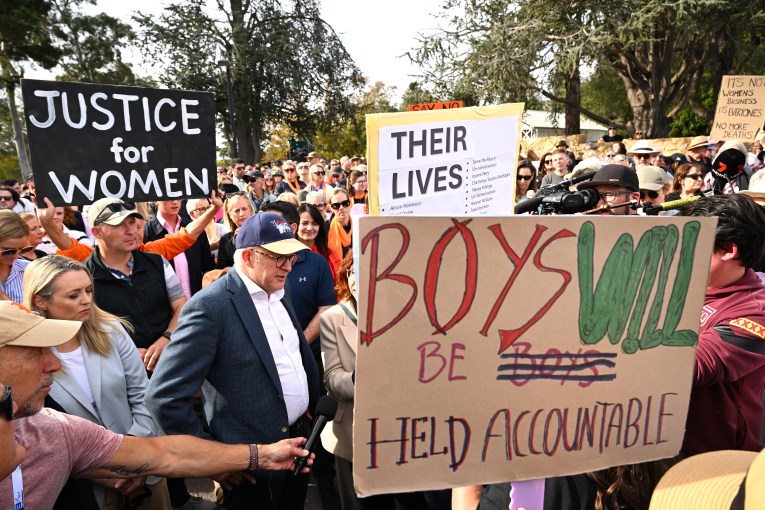Political rebels, renegades and punks
It is not often the major parties of Australian politics find themselves in the shade, but of late, it’s the eccentric outsiders – like Clive Palmer and the ‘rogue’ Victorian politician Geoff Shaw – who are hogging the limelight.
Part of the electoral appeal of minor parties is clearly in raging against the machine, sticking it to The Man, striking a blow for diversity, and all the other iterations of the Tall Poppy Syndrome.
Mr Shaw, who quit the Victorian Liberal Party over an expenses scandal, has certainly attempted to position himself in this light – as an everyman waging righteous war on the political behemoths on both sides of the chamber.

Independent MP for Frankston Geoff Shaw.
“I’ve got these two Goliaths against me and that is just the fact,” Mr Shaw told the media this week. “Both don’t like an independent voice. I’ve got union thugs on one side and moral cowards on the other.”
When politicians start paying attention to their conscience and not the party line, I think that we will have a much better parliament.
But Glenn Druery, a hero of the minor parties known as “the preference whisperer”, is not buying into this portrayal of Mr Shaw.
“The Frankston Farce is a poor reflection upon himself,” Mr Druery says.
“He is trying to drive a wedge between the major parties in Victoria to bring on a constitutional crisis for no other reason than to save his own skin.”
Effective? Not so much
Whether or not controversial figures like Mr Shaw and Mr Palmer will actually make a dent in major party dominance is dubious.
Dr James Jupp, a researcher at the Australian National University who has taught political science here and in the UK, says the influence of the major parties is undoubtedly being eroded, but it is more a case of nibbling around the edges than destroying the core of our two-party system.
“It is being eroded, but I don’t think it’s being eroded to the point of death. There’s a difference between defections and erosions, which certainly do happen, and the actual death of a major party,” Dr Jupp says.
“The media tends to blow these figures up into more important figures because they make life more interesting. Particularly in Victoria, where the influence of one person could very easily mean the defeat of the State government.
“I’m not sure that [the two-party system] is heading anywhere, except round and about, in and out,” Dr Jupp says.
Punks in suits
Liberal Democrat Senator-elect David Leyonhjelm is one of the beneficiaries of Australia’s fascination with political punks – those who do not conform to the red-tie, blue-tie dichotomy. He attributes the popularity of the political periphery to voter frustration.
“What we’re seeing is a dissatisfaction with both the big parties,” Mr Leyonhjelm says.
“There is a percentage of Australians who will vote for anything ‘None of the Above’. They like the non-conformist – the one who stands out.”
The risk, for Mr Leyonhjelm and his fellow small party colleagues, is that rebels like Mr Shaw and jovial quote-machines like Mr Palmer will make voters reconsider nonconformity.

Palmer United Party leader Clive Palmer (centre) flanked by his party’s senators-elect.
“There is a risk. I don’t know about Geoff Shaw’s influence. He’s one person, and he fell out with the Liberals over an issue with his expenses. But Palmer’s activities are likely to colour the attitude of voters towards minor parties.
“If they perceive him to be destructive or silly … or not constructive, then all of the other minor parties are likely to pay a price for that, including us.
“We don’t want to be tarred with the brush of being unhelpful and not constructive,” Mr Leyonhjelm says.
Speaking at the Press Club on Wednesday, former Prime Minister John Howard said that the best way for the major parties to reduce the influence of the minor parties is not to change the voting system, but to collaborate on major reforms.
The Liberal and Labor Party should “get together on sensible change”, Mr Howard said.
Letting it all hang out
For Glenn Druery, one way to solve these spats and defections, and maybe even to sate our thirst for political novelty and trivia, is to free our mainstream politicians from the straight jacket of the party line.
“One of the few things I admire about the American political system is that it gives members the ability to cross the floor. I think we need to see more of that type of freedom in this country so that members of both parties can vote on what’s right, and not what is the party line.
“When politicians start paying attention to their conscience and not the party line, I think that we will have a much better parliament,” Mr Druery says.
If you liked this story, try this:
• Crashing the Party: Australia’s political trouble children








